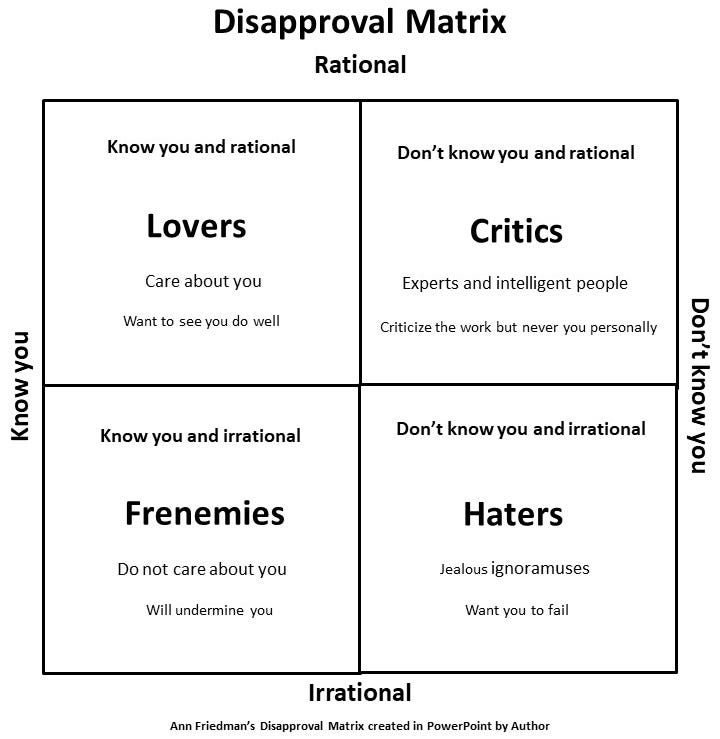Navigating Criticism: A Guide to Personal Growth and Resilience
Written on
Understanding Criticism
Have you ever faced criticism? If you're living, chances are high that you have. Criticism is an unavoidable aspect of life that even the most accomplished individuals encounter. A simple web search reveals numerous types of criticism. However, this discussion will focus on the criticism that manifests in our personal and professional lives, which may or may not be solicited and can even include self-critique.
The term "criticism" is defined as:
“Criticism (noun) — the expression of disapproval of someone or something based on perceived faults or mistakes.” - Oxford Languages
Exploring Types of Criticism
Ann Friedman’s Disapproval Matrix provides an insightful framework for understanding different types of criticism. This matrix allows for a quick assessment of both the source and nature of criticism.

Friedman’s matrix features two axes: one ranging from “rational” to “irrational” and the other indicating whether the critic “knows you” or “doesn’t know you.” The quadrants are categorized as follows:
Lovers — top left (know you and rational)
This group comprises those who genuinely care about you and wish to see you thrive, including friends and family.
Critics — top right (don’t know you and rational)
This segment includes knowledgeable individuals who provide objective feedback on your work, which can be instrumental for improvement.
Frenemies — bottom left (know you and irrational)
This category consists of individuals who may not support your success and can offer harmful feedback. This also includes self-criticism.
Haters — bottom right (don’t know you and irrational)
This group includes those who are critical without any constructive purpose, often aiming to belittle you.
As Elbert Hubbard wisely noted, “There is only one way to avoid criticism: do nothing, say nothing, and be nothing.”
Dealing with Different Types of Criticism
Now, let's discuss effective strategies for managing each category of criticism as outlined in Friedman’s matrix.
Lovers
Embrace their feedback with an open mind, as they provide valuable insights. Since they are invested in your well-being, their constructive criticism is intended to help you succeed. Welcome their feedback and make necessary adjustments.
Critics
Take in the criticism that resonates with you and use it for your growth. While their feedback may sometimes sting, it's essential to remember that their intent is not personal. They focus on your work, and their insights can guide your development.
Frenemies
Most of their criticism can be dismissed, but be on the lookout for any useful nuggets. This group often critiques you personally rather than your work, so it's best to avoid seeking constructive feedback from them.
Haters
Completely disregard their comments. Since they lack a personal connection and often react irrationally, their opinions are rarely helpful. Ignoring them is the most effective strategy.
Additional Strategies for Managing Criticism
- Listen carefully to understand the feedback.
- Identify any positives that may emerge from the criticism.
- Express gratitude for valuable insights.
- Be aware of your defensiveness; take deep breaths to stay calm.
- Avoid immediate responses; give yourself time to process.
- Revisit the criticism later for a clearer perspective.
- Control the exposure to harsh criticism, such as limiting social media interactions.
- Inform the critic that you will consider their input thoughtfully.
- Maintain your truth and avoid compromising it.
- Cut off communication if insults arise.
As Ralph Waldo Emerson stated, “Let me never fall into the vulgar mistake of dreaming that I am persecuted whenever I am contradicted.”
Final Thoughts
Ultimately, the way you handle criticism is entirely up to you. Accept feedback from rational sources and disregard that from irrational critics. Remember, when you allow yourself to get upset, you relinquish your power. Keep control over your reactions and maintain your self-worth.
To put it simply, consider criticism as either a tool for improvement or something to let go of.
I’ll leave you with a final thought from Elbert Hubbard: “The final proof of greatness lies in being able to endure criticism without resentment.”
May you navigate criticism wisely and cultivate resilience!
In the video titled "How to Deal with Criticism," learn practical methods for addressing criticism effectively and using it for personal growth.
In "How do you handle CRITICISM? | Simon Sinek," discover insights from renowned leadership expert Simon Sinek on coping with criticism.